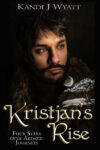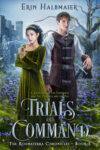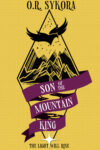38. Should Christians Enjoy Fantasy with Fictional Magic? Part 2
Podcast: Play in new window | Download (Duration: 1:16:07 — 71.0MB) | Embed
Want to be perfectly safe? Want to guarantee your own life, foretell the future, and control your world? Want to … become a god? Then just follow this four-step method:
- Believe a lie.
- Practice some occult method that the real God forbids.
- ????
- Profit.
Of course, this kind of idolatrous witchcraft doesn’t work in reality. It also isn’t usually the same as reading a fantasy novel with “magic” people, practices, or things in it. But what if Christians can’t tell them apart? Or feel genuinely tempted by the association between occult magic God forbids, and fictional magic that you might enjoy?
Concession stand
- Repeated: “fictional magic” definition versus “occult magic” definition.
- In this series, we often cite examples of “white magic” from Christian circles.
- This isn’t because we Blame the Church first. It’s just based on familiarity.
- We don’t believe the Holy Spirit is useless. Most in Christ’s Church know better.
- More often, to be sure, it’s non-Christians who practice idolatrous “magic.”
1. Fictional magic may or may not provoke these temptations in readers.
- Again, it’s helpful to note what God doesn’t warn against in Deut. 18.
- Do imaginations or folklore ideas, such as flying brooms or magical “superpowers,” fit inside the Biblical category of actual witchcraft?
- Or do they come from popular culture, historic folklore, or story traditions?
- Reading and imagining these does not automatically count as doing divination or practicing idolatry.
- Things, in the Bible and in reality, do not always lead to automatic sin
- For some people, certain things do not automatically tempt us to sin.
2. Yes, many Christians would disagree on this. How do we respond to them?
- Some fantasy fans, and readers, seem truly tempted by stuff that doesn’t tempt us.
- Here we might run into some differences between generations, regions, and experiences.
Romans 14:1–6:
As for the one who is weak in faith, welcome him, but not to quarrel over opinions. One person believes he may eat anything, while the weak person eats only vegetables. Let not the one who eats despise the one who abstains, and let not the one who abstains pass judgment on the one who eats, for God has welcomed him. Who are you to pass judgment on the servant of another? It is before his own master that he stands or falls. And he will be upheld, for the Lord is able to make him stand.
One person esteems one day as better than another, while another esteems all days alike. Each one should be fully convinced in his own mind. The one who observes the day, observes it in honor of the Lord. The one who eats, eats in honor of the Lord, since he gives thanks to God, while the one who abstains, abstains in honor of the Lord and gives thanks to God.
(Romans 14:1–6, ESV)
- These texts are about the “gray areas,” stuff that tempts some but not others.
- People tempted by a thing are “weaker,” and those who aren’t are “stronger.”
- Paul talks about “opinions” in Romans, and “association with idols” in 1 Corinthians 8.
- He doesn’t speak of stronger folks having convictions, versus compromisers.
1 Corinthians 8:
Now concerning food offered to idols: we know that “all of us possess knowledge.” This “knowledge” puffs up, but love builds up. If anyone imagines that he knows something, he does not yet know as he ought to know. But if anyone loves God, he is known by God.
Therefore, as to the eating of food offered to idols, we know that “an idol has no real existence,” and that “there is no God but one.” For although there may be so-called gods in heaven or on earth—as indeed there are many “gods” and many “lords”—yet for us there is one God, the Father, from whom are all things and for whom we exist, and one Lord, Jesus Christ, through whom are all things and through whom we exist.
However, not all possess this knowledge. But some, through former association with idols, eat food as really offered to an idol, and their conscience, being weak, is defiled. Food will not commend us to God. We are no worse off if we do not eat, and no better off if we do. But take care that this right of yours does not somehow become a stumbling block to the weak. For if anyone sees you who have knowledge eating in an idol’s temple, will he not be encouraged, if his conscience is weak, to eat food offered to idols? And so by your knowledge this weak person is destroyed, the brother for whom Christ died. Thus, sinning against your brothers and wounding their conscience when it is weak, you sin against Christ. Therefore, if food makes my brother stumble, I will never eat meat, lest I make my brother stumble.
(1 Corinthians 8, ESV)
3. We can glorify Christ with fictional magic! Yet let’s care for family and fans who still struggle.
- Many people, myself included, do not associate folklore magic with idols.
- These stories do not tempt us to sin more than usual.
- Depending on our relationships, we can help other Christians understand the differences.
- We can also explore the spiritual benefits of stories with fictional magic.
- For instance, “magic” in fiction (with or without Christ-figure) can challenge materialism.
- Tolkien and Lewis, of course, found their faith awakened by pagan myths.
- For more nonfiction-oriented Christians, John Piper presents our need for imagination in “left brain” terms:
This double experience of romanticism and rationalism, leading finally to God, gave to Lewis a key to the power of language to reveal the deeper meaning of the world, namely, the key of likening. What I mean by the key of likening is this: likening some aspect of reality to what it is not can reveal more of what it is.
- We must be careful to love genuine “weaker brothers,” but this isn’t the same as “offended brothers.”
- We all know situations where the “weak” person actually dominated other Christians.
- Recall this Latin phrase: abusus non tollit usum. “Abuse does not disqualify proper use.
- Randy Alcorn has a great article: A Stumbling Block: What It Is and What It Isn’t:
The biblical stumbling block involves a more mature believer exercising Christian liberty in a way that hurts a younger less mature believer. It does so by prompting him to say “I guess I can go ahead and drink alcohol, watch R-rated movies, etc.” when by doing so he will end up sinning because of being unable to handle this action that another believer might be able to handle.
In many churches, it is older Christians, who think of themselves as more mature, who are offended at the behavior of younger Christians. Almost never are they tempted to do what the younger Christians are doing that offends them (such as listening to rock music), and therefore their offense has nothing to do with the stumbling block of 1 Corinthians 8 or Romans 14.
- Paul taught all this out loud. No “secret knowledge” for super-Christians here.
- And yet some Christians are stronger. Let’s learn from them.
- No “super-Christians” allowed. We must share any “secret sauce” recipes.
- As always, let’s keep studying the ultimate purpose for these stories.
- It’s not just to teach or evangelize, but to help us glorify God in Christ.
Stranger than fantastical fiction
#FunFactFriday – The Royal Navy has been testing Jet Suit assault teams to determine if the Iron Man-like suits could be used to rapidly swarm and board ships. U.S. Special Operations Command is also evaluating a jetpack that can reach speeds of more than 200 mph. pic.twitter.com/mo5FoGWkDu
— U.S. Naval Institute (@NavalInstitute) October 16, 2020
https://platform.twitter.com/widgets.js
Fantastic fans
Emory Alexander writes:
Love the pod cast! I’m sure many of your listeners are aspiring authors, like me, and would probably really appreciate a “publishing for dummies” episode. I know I would love to hear about each step in the process from starting to write all the way to seeing your book on a shelf, including all the steps in the editing process, to having an agent or not, how to get paid, pros and cons of traditional vs self publishing, as well as how to self publish, writing software you recommend, etc… I know thats not just about fantasy, but you could throw in something about what makes the fantasy market especially challenging, or rewarding. Just a thought. Keep up the great work!
We respond briefly by providing some resources for writers, such as Realm Makers and the new RealmSphere network. Among podcasts, we recommend The Christian Publishing Show, Novel Marketing, and Helping Writers Become Authors.
Next on Fantastical Truth
He’s no cartoon. He’s no misunderstood monster. Instead, the infamous Count Dracula is a hideous perversion of humanity. This parasitic undead being preys spiritually and physically on the innocent, and must be destroyed. Join us as we explore Bram Stoker’s novel Dracula and its incredible reflections of good heroes who use common and sacred weapons to hunt and to slay this incredible evil.




























Share your thoughts about this podcast episode